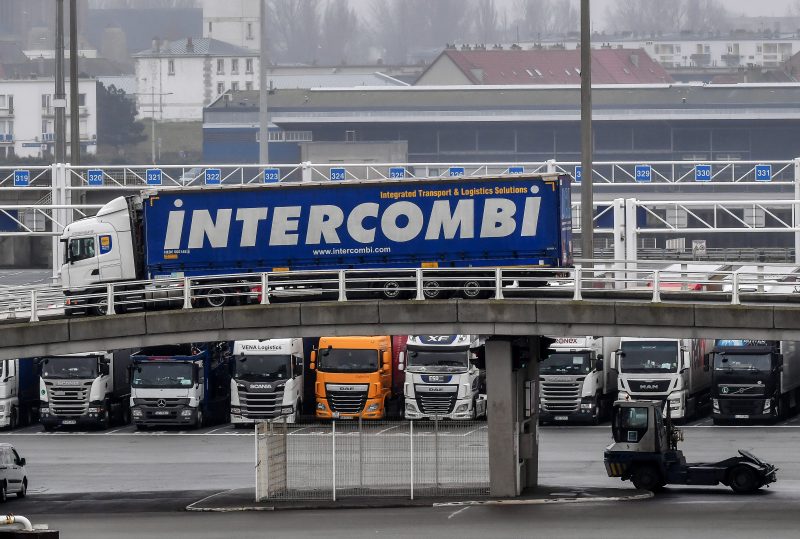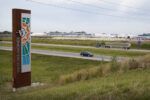Keep calm and carry on: Northern France ‘ready’ for Brexit
There are fears Brexit could lead to monster traffic jams around the port of Calais and also in Dover in the UK (Philippe HUGUEN)
Lille (France) (AFP) – Northern France, with its huge ports and historic trading links to England, has more to fear than most if Britain makes a messy exit from the European Union next month, but local leader Xavier Bertrand insists everything is ready.
For months, politicians on both sides of the narrow stretch of sea that separates France and Britain have been warning about the consequences of a disorderly “no deal” Brexit, from transport chaos to major trade disruption.
But Bertrand, who until recently feared monster traffic jams himself around the port of Calais, now predicts that cars, trucks and trains will continue flowing smoothly to Britain whatever the outcome of the tortuous Brexit negotiations.
“From our point of view, for the ports and the tunnel, we will be ready,” he told AFP in Lille, the capital of the Hauts-de-France region that sits just 27 kilometres (17 miles) from southern England at the narrowest point of the Channel.
“Perhaps having sounded the alarm, that woke everyone up,” said the head of the region since 2015, a right-wing independent who is widely viewed as having national, perhaps even presidential, ambitions.
Finding solutions for Brexit, which will in theory see Britain leave the common customs system of the European Union on March 29, has entailed forward-planning, extra resources and technology, he explained.
Around two million trucks head to Britain every year on ferries from Calais, while an estimated 17 percent of all goods exported from Britain travel in the opposite direction through Dover.
Bertrand says that truckers will be encouraged to fill out their customs paperwork on a new online platform before arriving at Calais or the nearby port of Dunkirk — which will speed up the loading of boats.
Anyone without papers will be stopped kilometres from the coast in newly created holding areas where customs officials — an extra 700 are being recruited nationally — will assist with the formalities.
New facial recognition technology will also be deployed to speed up passport controls.
– ‘Pragmatism’ needed –
Problems, if there are any, are likely to come from the British side — or EU headquarters in Brussels, Bertrand believes.
“I know that for Dover it is more difficult,” he said, referring to physical restrictions imposed by the white cliffs surrounding the town. “The access to their port is more difficult.”
And he has pleaded for “pragmatism” from EU leaders and officials dealing with the process of detaching Britain from a trading bloc it joined more than 40 years ago.
The biggest error would be to insist on re-instating inspections on food and animals being transported between the countries, given that the health and safety norms are currently the same.
“If the Brits change their norms, then we’ll change our controls, but until then, let’s show some common sense,” he said.
And any attempt to introduce visas for Britons travelling to continental Europe, and vice versa, would also be impossible to manage in the short-term.
“We’d need hundreds of border agents who won’t be there for March 29 nor even for 2020,” he said.
– Brexit business –
Further ahead, once Britain’s divorce from the EU is finally agreed, Bertrand sees business opportunities, like his political rivals in areas of Ireland, Belgium and the Netherlands which also sit across the sea from Britain.
On his Twitter account, he trumpets every new investment announced by a British company, from drugmaker AstraZeneca to metals group Liberty House and most recently a driving experience group called Palmer Sport.
“It’s not about going to poach them,” Bertrand said. “When you see friends in difficulty you shouldn’t try to take advantage.”
But he’s clear that Brexit will have an economic cost for Britain and that the Hauts-de-France region, with its cheap real estate and manufacturing base, particularly in the car industry, could benefit.
“If they want to leave, they’ll have the easiest conditions with us,” he claimed.
He has already proposed a low-tax trade zone to attract companies to the area around the port of Calais and the entrance to the Channel tunnel, which has provided a high-speed rail link between Britain and the continent since 1994.
“The president (Emmanuel Macron) has said yes,” Bertrand said.
A new international school in Lille is also part of efforts to make the city more attractive to British executives, who can reach London in one hour and 20 minutes by train.
Disclaimer: This story is published from a syndicated feed. Siliconeer does not assume any liability for the above story. Validity of the above story is for 7 Days from original date of publishing. Content copyright AFP.


